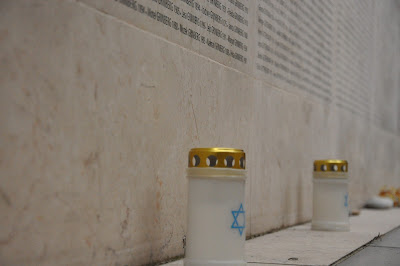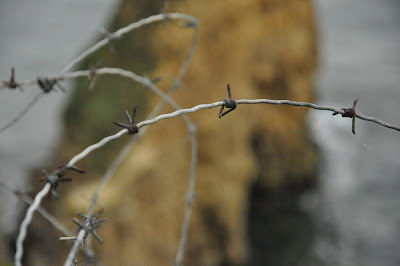I have been able to see the scars of the wars in expected and unexpected places. Paris has a military museum which has an impressive timeline of French history including details about France's involvement in the American Revolutionary War and World War II. Not surprisingly the exhibits were from the French perspective highlighting their efforts and strengths. It got me thinking... how many things do we learn solely from one perspective? And more than that, if I grew up learning the American perspective of World War II, and I've now learned the French's story, then what would the Germans have to say? Would they defend their seemingly horrific past, or would they admit fault? I've never been to Berlin, but some day I want to go and learn more. I think I would be surprised by what I saw. Lesson 1: One story is never enough.
Wandering one day, I stumbled across the Shoah Memorial... the Parisian Holocaust Museum. It is a free museum that highlights German occupation and deportation of the Jews. While I was struck by the pictures and firsthand accounts of the concentration camps, I was equally struck by a unique perspective written on a plaque at the beginning of the exhibit. I had no idea that during German occupation of France, the French assisted the Germans in finding and deporting Jews in hiding. At the entrance of the museum, there was a note from the French government saying something to the effect of, "It took years for the French to admit their involvement in the Holocaust, but it is important to admit our role and educate you in order to ensure that these mistakes are never repeated." I know hindsight is 20/20, but the ability of the French to admit their hand in such a horrible tragedy takes humility and courage. Lesson 2: Learn from the past.
 At the same museum, I found myself incredibly emotional. There were two walls of names. The first one was a wall that named every French Jew who was put to death in a camp. Visitors to the museum could light candles and place them in front of various names, and I found myself stopped in front of one wall looking at the numerous people who had the last name of Lehman. Maybe they were my family, maybe not, but regardless, they were daughters, sisters, friends, teachers... who knows! Could have been me. The second wall was a list of names of those brave people who helped the Jews. Whether they stood up to the Nazis, led an underground movement, or housed illegal Jews, this list of names was to honor people who risked their lives. Would that have been me? I think it's so easy to read accounts of the Holocaust and say "How did they not do SOMETHING?" But standing in front of that wall with tears streaming down my face, I wasn't sure. Lesson 3: Stop judging.
At the same museum, I found myself incredibly emotional. There were two walls of names. The first one was a wall that named every French Jew who was put to death in a camp. Visitors to the museum could light candles and place them in front of various names, and I found myself stopped in front of one wall looking at the numerous people who had the last name of Lehman. Maybe they were my family, maybe not, but regardless, they were daughters, sisters, friends, teachers... who knows! Could have been me. The second wall was a list of names of those brave people who helped the Jews. Whether they stood up to the Nazis, led an underground movement, or housed illegal Jews, this list of names was to honor people who risked their lives. Would that have been me? I think it's so easy to read accounts of the Holocaust and say "How did they not do SOMETHING?" But standing in front of that wall with tears streaming down my face, I wasn't sure. Lesson 3: Stop judging.Aidan and I took a trip to the D-Day invasion beaches a few weekends ago. Ironically it was a cold rainy day, much like the day of the actual invasion, and we actually enjoyed the rain. It seemed very appropriate- standing at the American Cemetery, staring at the thousands of white crosses as it drizzled rain. And as we strolled through the cemetery and then down to the beaches, the sacrifice that was made that day seemed so much greater than it had ever seemed to me before. When you see the beaches and the cliffs that they climbed and the German guns that were raining bullets, you are immediately taken back and become afraid. Further thought made me realize that the kids who stormed the beaches were my age, and a lot like me, they were doing their job in an attempt to make the world better. I cried with the rain. To make it even more empowering, on our drive out of town, Aidan and I noticed a billboard. It had a picture of soldiers, and it said in English "Thank you to our liberators for setting us free." It's almost 70 years later, and they are still humble enough to do that. Are we? Lesson 4: Say thank you.






Liz... Chills reading this post! Love your thoughtfulness. If you're particularly interested in World War II (I LOVE reading about it), there is a novel you might like to read. It's fiction, but I would imagine reading it while you're there in the middle of all of that history might prove to be particularly enchanting. It's called Sarah's Key. It's heartbreaking in many ways, starting with the French assisting the Germans with the deportation of Sarah and her family, but it is one book that I couldn't stop thinking about after I had finished! If you can't find it while you're there, I have a copy you can borrow when you return to the States!
ReplyDeleteAs always, love your writing and jealous of your adventure! Say hello to Aidan for me! Xoxo